
NO BARS, NO GUARDS, NO LOCKS
Tattered lace curtains, taped family photos, patterned carpets, plastic flowers and snappy fabrics. Gabriela Maj’s portraits from the series Almond Garden have all the chirpy, easy-to-patronize details of portraiture from a former Soviet controlled region. Lost you already? Think of Sergey Poteryaev’s portraits, Rafal Milach’s Winners in Belarus, Olya Ivanova’s portraits of young girls in rural Russia or anything by Sasha Rudensky. More directly consider the backdrops photographed by Lucia Ganieva.
(As much as I hate top-loading an article with links to a host of other photographers, I must because before we can understand how special and different Maj’s work is, we must appreciate the en vogue photo practices from which it emerges and above which it must rise.)

For the moderately trained eye, Maj’s work is obviously anchored within a super-region that still carries the visual culture of its immediate past. No matter how hard former Soviet countries try, nor how quick they build, photographers still seem to be able to isolate the details that’ll whiplash people back in time. The problem I outline here is twice as tricky because we, in the west, think that all changes in the former USSR since the end of the Cold War must at least be headed in the right direction.
The framework I am trying to set up here, basically, is that in which Soviets — and all those formerly-ruled by them — are ‘Othered’ and misunderstood by most viewers looking at photographs made in the region. I offer a word of caution before you step into Maj’s portraits. The stories burdened by the women in Maj’s Almond Garden are devastating and the worst thing we can do with Maj’s work is to lump it in with all that work of the knackered Russian empire.
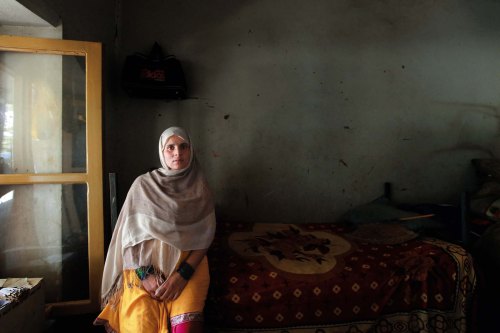
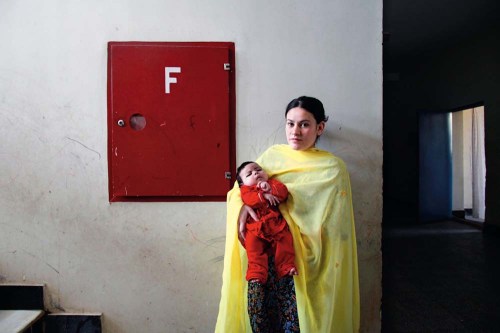
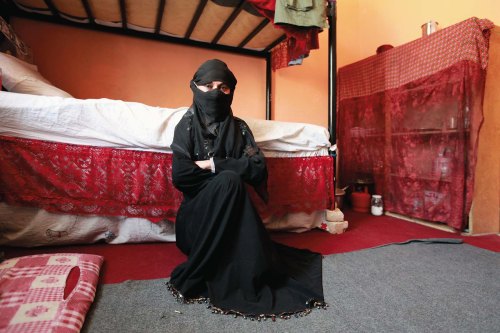
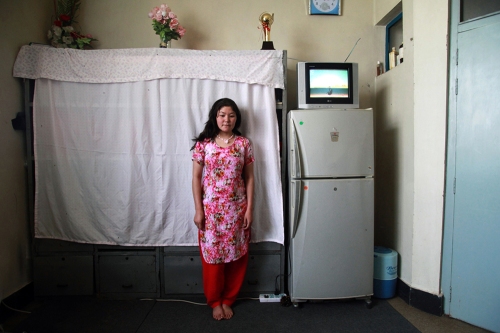
Over the course of four years (2010 – 2014), Polish Canadian photographer Gabriela Maj travelled throughout Afghanistan to collect portraits and stories from inside the country’s women’s prisons. She visited with many of her subjects on multiple occasions.
Maj actually believes that being of Polish origin helped her to gain relatively unhampered access. Poland and Afghanistan shared a history of Soviet oppression.
It also helped being a woman. In fact, her mode and ability of movement revealed the so very twisted logic of a prison system that brutalised women.
“As a solitary female photographer, accompanied only by an Afghan interpreter, I was frequently left alone in the prisons once our guard escort tired of monitoring me. My sense was that unaccompanied by any security, a woman, albeit a foreign one, was not considered a threat,” she writes in an essay featured in the book. “Being overlooked in this way became a strategy that ultimately exposed the context within which I was working, one where women’s narratives were considered irrelevant to the power dynamics that ran the country.”
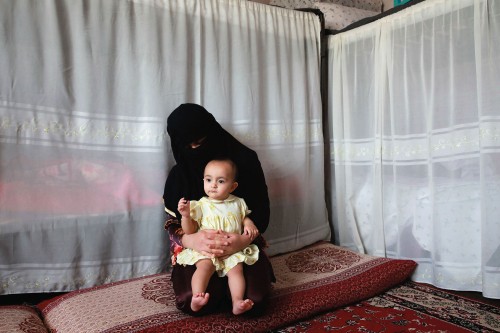
Maj went the extra mile and then some. The least we can do it get there with her. The majority of the prisoners Maj documented were incarcerated for what are known in Afghanistan as “moral crimes,” a term used to condemn those who’ve had sex outside of marriage, or run away from any number of abuses — forced marriages, being sold into prostitution, domestic slavery, physical violence generally conducted by their husbands, and rape and involuntary pregnancy.
Indeed, the portraits are powerful but it is the relentless injustice of the testimonies of the women that delivers the power and absolute necessity of Almond Garden. Maj has changed the names of the women to protect their privacy. She goes a step further and moves the stories to the back of the book.
“Separating the portraits from the stories has allowed for a record of the experiences of this group without any one woman being defined by the crime she was accused of,” explains the press release.
Each entry leads with the offense that the woman is accused with, her age and the length of her sentence.
I haven’t been so effected by a project pairing portraits of women with their transcribed words since, strange as it might be to offer, Malcolm Venville’s The Women of Casa X, which features portraits of aging sex-workers in Mexico. But, then again, perhaps not so strange? Both the women in Melville’s work and the prisoners in Maj’s work have been categorized, judged, ostracized and maligned by dominant patriarchal culture. In both cases, if the photographer hadn’t shown up, these stories would be buried (which is the culture’s intent, right?)
“Often times rejected by their families, these women’s situations can become grave after they are released,” says the Almond Garden‘s blurb. “Without the protection of their relatives that spurned them, they are often in very real danger of being killed or tortured unless they are able to seek refuge in a women’s shelter.”
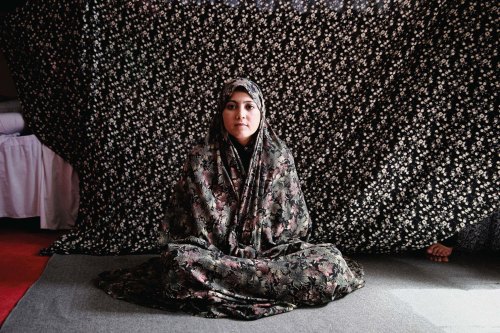
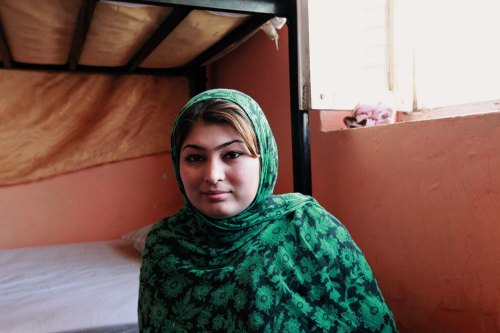
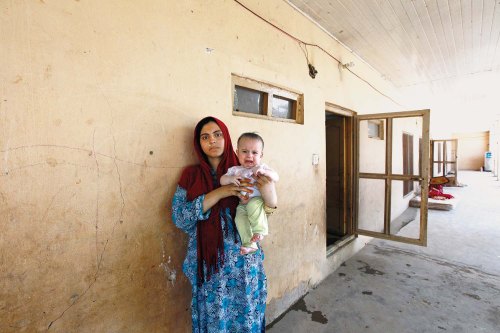
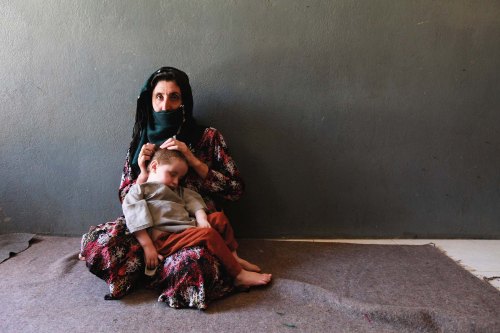
It is bittersweet to think of these tortured moments in prison might be, for some women, where emotional and physical trauma exists least. That said, there is no psychological treatment or therapy available within the prisons Maj visited.
The title of the book Almond Garden is a play and is incongruous. It is the English translation of Badam Bagh, the name of Afghanistan’s most notorious penitentiary for women, located on the outskirts of Kabul.
Almond Garden publishers, Daylight Books, say that Maj’s project is the “largest record documenting the experiences of incarcerated women in Afghanistan produced to date.”
It’s stunning. It works in waves as all good photography should. I’ve been drawing important lessons from Almond Garden each time I’ve returned to it. Aesthetically, it’s as good as Michal Chelbin’s Swans and Sailboats, portraits from Ukraine and Russia. Ethically, I think it surpasses it as Chelbin is evasive about the details of her access.
BOOK TOUR, NOW!
Maj is currently on book tour.
Los Angeles tonight! If you’re in San Francisco, hit up one of her two events next week. On May 5th, at Modern Times Bookstore, or on May 6th at The Women’s Building.
BUY THE BOOK
Here, for $45.00.
DATES ON THE ALMOND GARDEN BOOK TOUR
May 1st, Exhibition and book signing with Daylight Books at the Leica Gallery in West Hollywood, CA.
May 5th, Presentation and book signing at Modern Times Bookstore in San Francisco, CA.
May 6th, Presentation and book signing at the Women’s Building,7:30-9:00, San Francisco, CA.
May 9th, Presentation and book signing at Apostrophe Books, 5:00-7:00pm, Long Beach, CA.
May 22nd, Presentation and book signing hosted by the Vermont Professional Photographers Association and the Peace and Justice Center, 6;00-8:00, Burlington, VT.
July 31st, Exhibition opening and book signing at Daylight Project Space , Hillsborough, NC.
August 8th, Book signing at Author’s Night 2015, East Hampton, NY.
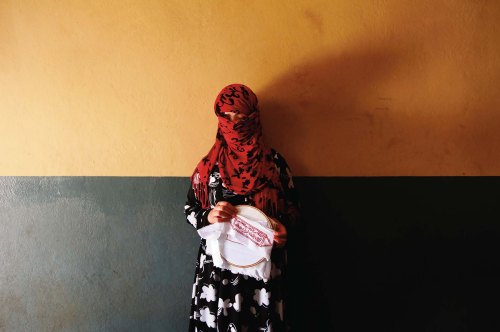

Leave a comment
Comments feed for this article